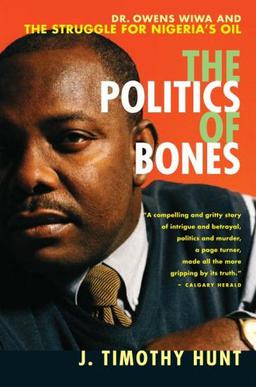The Politics of Bones by Timothy Hunt (Book Review)

On the morning of November 11th, 1995 the world woke up to the headlines that the well-known environmental activist Ken Saro-Wiwa had been executed, along with eight other men, on the implausible charges of conspiracy to commit murder. The real reason for the execution, which was articulated by all the major press outlets at the time, was that Saro-Wiwa had been leading a non-violent struggle on behalf of the Ogoni people against the abuses of Nigeria’s various military and civilian governments and the environmental despoliation of their land by Royal Shell’s oil operations in the Niger Delta. The response from the international community was strong, and Nigeria was kicked out of the Commonwealth until 1999. While the condemnations at the time were largely symbolic (Shell continued to pump oil out of the ground and Nigeria continued to export it), at least the international community made an effort to uphold human rights, in contrast the White House’s current response on the contemporary Khashoggi affair.
In Timothy Hunt’s masterful narrative of the plight of the Wiwa family, told mainly from the perspective of Ken’s younger brother Dr. Owens Wiwa, we see both the heroic non-violent struggle of Ken Saro-Wiwa and other Ogoni activists as well as the corruption and brutality of the Nigerian state and the foreign corporate interests operating in the Delta. More than just a depressing chronology of repression and the political dynamics of Nigeria since independence, The Politics of Bones gives an intimate account of Ken, Dr. Owens, and the other members of their family as well as the messy tribal politics of the Niger Delta. While Nigeria today has become a byword for corruption and poor governance, at the time of independence, like many other African countries, Nigeria had an educational and governmental system that was able to produce highly capable men like Saro-Wiwa. Born in 1941 to the son of an Anglican minister, Ken was one of the tiny numbers of native Africans who had access to education, which the British set up in order to ensure they would have enough domestic talent to be able to run their colonies.[1] His early life was highly academic with Ken attending an elite high school, studying English at the University of Ibadan and then becoming a teaching assistant at the University of Lagos.
When the Biafran Civial War broke out in 1967, Ken was on the Federalist side, in contrast to many of the other tribes in the Delta who supported having their own independent state. His loyalty at the time allowed Ken to obtain a senior government position and establish many of the government contacts that would be useful in later years for protecting the Wiwa family from reprisals. Continued support for the Ogoni independence movement ultimately led to Ken losing his government role as District Commissioner. Amazingly, he was able to re-cast himself as a business man and set up many successful companies in real estate and retail along with a writing career in which he wrote many scripts for TV and radio.
At the start of 90s, Ken became exclusively focused on Ogoni activism, which he conducted through various channels including the Movement for the Survival of the Ogoni people (MOSOP), the Unrepresented Nations and Peoples Organization (UNPO), as well as international campaigns to shame and publicize Shell’s activities in Nigeria. After being arrested for short periods of time in 1990 and 1992, the threats to Ken’s life became more serious after General Sani Abacha took power in 1993 and effectively gave his government absolute power.
The techniques the Nigerian government employed to harass Ogoni people and Ken’s family were brutal, but also smacked of incompetence. Death squads were sent in to slaughter whole villages with “official” reports citing the deaths to inter-tribal rivalries. Certain members of the MOSOP leadership were bought off and various attempts were made to undermine Ken’s authority. A stream of constant legal harassment forced the Wiwa’s to sell off many of their business interests which ultimately bankrupted Ken and his brother. But because this was Nigeria, even the government repression was incompetent with Dr. Owens being able to hide out in different cities for long stretches of time and Ken being able to keep his government house for almost a decade after he was dismissed from his position. Ken’s family was also able to bring him food and medication by bribing the prison guards throughout his various detentions.
One of the most interesting parts of The Politics of Bones is reading how Dr. Owens Wiwa tried to meet and lobby on behalf of his brother with all the major diplomatic and corporate representatives in Lagos on the eve of his brother’s execution. Well-meaning bureaucrats often gave him a sympathetic ear and he was even able to meet with Brian Anderson who was the head of Shell’s Nigerian operations. Despite his tireless effort, international pressure was not able to reach to the highest levels of the Abacha regime and Ken was ultimately executed. Post-execution, we learn how Dr. Owens and his family escaped from Nigeria and ultimately ended up in London where they received unlikely support from Anita Roddick (the founder of the Body Shop) who put them up in one of the London flats.
I am embarrassed to say that there were some evenings when I was unable to read this book as the deprivations suffered by Ken and his brother and their corresponding stoicism weighed too heavily on me after a long day of work. This admission of weakness of my part as a reader gives a sense of how heroic and brave their struggle was. Despite hundreds of billions of dollars of petroleum having been pumped out of Nigeria since independence, Nigeria’s standard of living was barely higher in the 2000 than it was in 1960.[2]. The natural wealth of Nigeria has not benefited the general population, and tragically the regions in which oil is most plentiful may have seen the least material advancement – a tragic example of the resource curse. While the Nigerian government and foreign corporations have never been held to account for their crimes, and the Wiwa family my never fully have justice,[3] the struggle of these men and their families shows that their will always be a small number of people in any human society who are incorruptible and display the best virtues of the human spirit.
-
To be clear, Britain’s intentions in this regard were not to have mass education of the Nigerian population, but rather a sufficiently talented elite. Although this policy ultimately led to elites that were able to lead the struggle for colonial independence. ↩
-
However in last 15 years Nigeria has seen real economic growth and rising living standards – a trend which has been observed in many other African countries. However the drivers of Nigeria’s future economic growth are almost surely to come from urbanization and the growth of the service sector in mega-cities like Lagos, rather than improved management of its oil reserves. ↩
-
The Wiwa family was however able to secure the remains of Ken. Even this process though was marked by several failed attempts and interference from the Nigerian government – giving the title to this book. ↩
